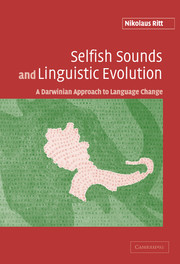Book contents
- Frontmatter
- Contents
- List of figures
- Preface
- 1 Introduction
- 2 The historical perspective
- 3 Approaching ‘language change’
- 4 The Darwinian approach
- 5 Generalising Darwinism
- 6 Towards an evolutionary theory of language
- 7 What does all this imply for the study of language change?
- 8 How to live with feet, if one happens to be a morph-meme
- 9 The prosodic evolution of English word forms or The Great Trochaic Conspiracy
- 10 Conclusion
- References
- Index
4 - The Darwinian approach
Published online by Cambridge University Press: 22 September 2009
- Frontmatter
- Contents
- List of figures
- Preface
- 1 Introduction
- 2 The historical perspective
- 3 Approaching ‘language change’
- 4 The Darwinian approach
- 5 Generalising Darwinism
- 6 Towards an evolutionary theory of language
- 7 What does all this imply for the study of language change?
- 8 How to live with feet, if one happens to be a morph-meme
- 9 The prosodic evolution of English word forms or The Great Trochaic Conspiracy
- 10 Conclusion
- References
- Index
Summary
Another curious aspect of the theory of evolution is that everybody thinks he understands it!
(Jacques Monod)A linguist's view of evolutionary biology
Why are life-forms as they are?
Among the many issues which biology deals with, the one which attracts the greatest interest beyond the boundaries of the biological community itself is the general question why living organisms are as they are. It has always intrigued people for various rather obvious reasons. First, we are living organisms ourselves, and why we are here is a rather obvious question to ask. Secondly, all species seem to be extremely well designed for the lives they are born into, and capable of amazing things: spiders spin webs out of a material that is so elastic and shock absorbent that attempts have been made to synthesise it for the production of bullet proof vests. Plants have the capacity to convert sunlight and water into storable energy: a feat which centuries of human research has not managed to achieve. Fish have perfectly streamlined shapes, which allows them to move efficiently and effectively in water, their natural habitat. And humans have central nervous systems so sophisticated that they admit of rational thought, language and culture. So complex and functional are the designs of nature that for a long time it was inconceivable that they could exist at all unless they had been designed and created by a supernatural artisan.
Information
- Type
- Chapter
- Information
- Selfish Sounds and Linguistic EvolutionA Darwinian Approach to Language Change, pp. 62 - 88Publisher: Cambridge University PressPrint publication year: 2004
